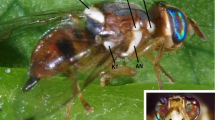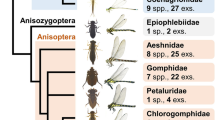Abstract
ACCOUNTS of the post-embryonic development of the tracheal system of any insect are extremely meagre. The development of the breathing folds (organs peculiar to the Aleurodidse and some of the Coccidse) has never been studied completely in any white–fly. I have carried out a study of the development of the respiratory system of the nymphal stages of the white-fly Dialeurodes dissimilis Quaint, and Baker, which occurs on Ixora parviflora in India, without doing any apparent damage to the host plant. Some extremely interesting and wholely unexpected results have thus come to light. The only previous account of the development of the tracheal system of a white-fly is that of Woodworth1, which, however, is inaccurate in many respects.
This is a preview of subscription content, access via your institution
Access options
Subscribe to this journal
Receive 51 print issues and online access
$199.00 per year
only $3.90 per issue
Buy this article
- Purchase on Springer Link
- Instant access to full article PDF
Prices may be subject to local taxes which are calculated during checkout
Similar content being viewed by others
References
Canadian Entomologist, 33 ; 1901.
Author information
Authors and Affiliations
Rights and permissions
About this article
Cite this article
ROONWAL, M. Respiratory System of the White-Fly, Dialeurodes dissimilis Quaint and Baker (Homoptera, Aleuro-didae). Nature 134, 218–219 (1934). https://doi.org/10.1038/134218c0
Issue Date:
DOI: https://doi.org/10.1038/134218c0
Comments
By submitting a comment you agree to abide by our Terms and Community Guidelines. If you find something abusive or that does not comply with our terms or guidelines please flag it as inappropriate.



